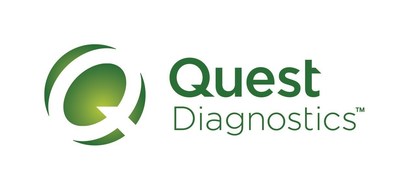SECAUCUS, N.J., Nov. 14, 2019 /PRNewswire/ -- A laboratory test that evaluates high-density lipoprotein (HDL) cholesterol function provides unique and novel information for assessing cardiovascular disease risk, according to data presented today (Abstract #1020) by Quest Diagnostics (NYSE: DGX) at the 2019 American Heart Association Scientific Sessions. The study is one of four the company will present at the conference, which runs November 16-18, in Philadelphia (Booth #1502).

"One in four Americans die from cardiovascular disease, but many could escape that outcome with early disease detection and preventive care," said Jay G. Wohlgemuth, M.D., Chief Medical Officer and Senior Vice President, Research & Development and Medical, Quest Diagnostics. "Our data demonstrates the value of diagnostic insights in illuminating risks in early treatable stages in clinical and workplace populations. We are particularly encouraged by our latest findings on the ability of HDL function testing to provide insights into disease risk independent of other markers."
HDL Function
Conventional cholesterol lab tests evaluate blood levels of HDL cholesterol (HDL-C), low-density lipoprotein (LDL) cholesterol, total cholesterol and triglycerides. A growing body of evidence suggests that the function of apolipoproteins that comprise HDL in removing cholesterol from blood vessel walls (called cholesterol efflux capacity or CEC) may be a better marker of disease risk than HDL-C. However, assessing CEC has traditionally involved sophisticated laboratory cell culturing, limiting its use in medical practice.
A team of experts from Quest Diagnostics and its Cleveland HeartLab cardiometabolic center of excellence developed a high-throughput laboratory method that evaluates certain apolipoproteins to establish a score predictive of CEC. The team correlated the test against other established markers, including HDL, LDL and insulin blood levels, in 341 individuals. The analysis found that the test provides "weak, but significant correlation" with markers associated with cardiovascular risk, and thereby provides "novel and unique information above what current tests offer to define a patient's risk."
"Too often, heart disease fails detection until a major cardiac event. While traditional methods of testing can identify risk in many patients, they may not always provide the full story," said Marc Penn, MD, PhD, FACC, Founder, Cleveland Heart Lab and Medical Director, Cardiometabolic Endocrine Division, Quest Diagnostics. "The present study provides tantalizing evidence that HDL function testing will complement other methods of evaluating an individual's cardiovascular health, enhancing risk detection and patient management."
The data follows publication of a study earlier this year in the Journal of American College of Cardiology by researchers from Cleveland HeartLab, Massachusetts General Hospital, Harvard Medical School and other prominent research institutions that found, among individuals with coronary artery disease, the HDL function test may be independently associated with cardiovascular death in individuals with coronary artery disease.i
The HDL Function test is expected to be available nationally in 2020. It will be the first significant innovation to emerge from Cleveland HeartLab since the company was acquired by Quest Diagnostics in December 2017.
VITAL Study and Employee Wellness
The company's medical experts will also participate in presenting findings from the VITamin D and OmegA-3 TriaL (VITAL) on the effects of Omega-3 fatty acids on downstream fatty acids and bioactive lipids. Recent research from VITAL found that marine omega‐3 supplementation (so-called "fish oil") significantly reduces the risk of myocardial infarction ("heart attack"). Quest Diagnostics is a designated lab provider for VITAL, providing analysis based on laboratory testing to evaluate the effects of vitamin D and Omega-3 on health outcomes.
Additional research explores the role of diagnostic insights in guiding employee health programs. One study investigates the correlation of an individual's cardiovascular health metrics, such as smoking and high cholesterol levels, on their spouse or partner's 10-year risk of atherosclerotic cardiovascular disease. Another study will examine the effectiveness of digital behavioral counseling, a facet of many employee health programs, on cardiovascular health over a 10-year period.
The titles of these Quest Diagnostics studies and date and time of their presentation at the conference are:
Annual Screening and Digital Behavioral Counseling in a Workplace Setting Reduce 10-year Cardiovascular Risk (#3165)
November 16, 2019, 1:30 PM - 2:00 PM
Correlation of Measures of Cardiovascular Risk to Novel Proteomic Measure of HDL Function (#1020)
November 17, 2019, 12:30 PM - 1:00 PM
Effects of Marine Omega-3 Supplementation on Fatty Acids and Bioactive Lipids and Associations with Risk of Cardiovascular Disease: Secondary Analysis from the Randomized Vitamin D and Omega-3 Trial (VITAL) (#3114)
November 17, 2019, 3:00 PM - 3:30 PM
High Concordance of Non-ideal Cardiovascular Health Metrics in a Nation-wide Study of 5,364 Spouse-pairs (#3071)
November 18, 2019, 1:30 PM - 2:00 PM
About Quest Diagnostics CardioMetabolic Disease Diagnostics
Quest Diagnostics is the leading provider of cardiometabolic diagnostic services, providing insights to empower individuals to identify disease risks in early, treatable stages. The company's services include the proprietary Cardio IQ® portfolio of lipid particle analysis and genetic and metabolic testing services. The company also provides inflammation and other novel lab markers of cardiovascular disease through its cardiometabolic center of excellence at Cleveland HeartLab, a business it acquired from Cleveland Clinic in 2017. Through research initiatives with Cleveland Clinic and One Brave Idea, Quest Diagnostics is championing new approaches to identifying cardiometabolic disease in the earliest, most treatable stages.
About Quest Diagnostics
Quest Diagnostics empowers people to take action to improve health outcomes. Derived from the world's largest database of clinical lab results, our diagnostic insights reveal new avenues to identify and treat disease, inspire healthy behaviors and improve health care management. Quest annually serves one in three adult Americans and half the physicians and hospitals in the United States, and our 46,000 employees understand that, in the right hands and with the right context, our diagnostic insights can inspire actions that transform lives. www.QuestDiagnostics.com.
i Natarajan P, Lyass A, Li Y, et al. Association of an HDL apolipoproteomic score with the presence of coronary atherosclerosis and incident cardiovascular death. J Am Coll Cardiol. 2019; 73:2135-2145.
![]() View original content to download multimedia:http://www.prnewswire.com/news-releases/hdl-cholesterol-function-lab-test-offers-novel-insight-into-cardiovascular-disease-risk-reports-quest-diagnostics-at-american-heart-association-2019-scientific-sessions-300957535.html
View original content to download multimedia:http://www.prnewswire.com/news-releases/hdl-cholesterol-function-lab-test-offers-novel-insight-into-cardiovascular-disease-risk-reports-quest-diagnostics-at-american-heart-association-2019-scientific-sessions-300957535.html
SOURCE Quest Diagnostics
